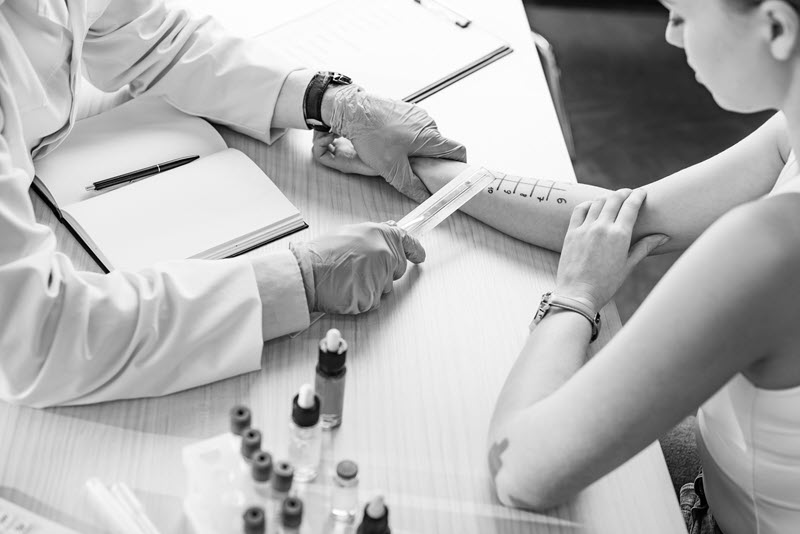Inflammation – the immune system’s reaction to injury or infection – is a natural part of the body’s natural healing process. External physical injury can present as redness, swelling, heat, and a tingly or painful feeling in the location of the wound. Internal inflammation occurs when our body is attacked by pathogens, allergens, or poisons and can sometimes be difficult to spot.
Inflammation can be acute (short-term) and useful, or chronic (long-term) and harmful. When it persists, inflammation intensifies existing medical conditions and causes other serious and even life-threatening illnesses.
This article explains the different types, symptoms, and causes of inflammation, offering a list of possible treatments for chronic inflammation.

When the body is exposed to offending external agents, such as viruses, bacteria, toxins, extreme heat (burns), and cold (frostbite), the immune system spurs into action. The body’s defense mechanism sends out white blood cells and other inflammatory mediators, such as cytokines (proteins that stimulate the growth of inflammatory cells) to destroy the invaders and repair the damage.
White blood cells (WBCs) are the vanguard in the fight against invading pathogens, infection, and tissue damage. Therefore, an elevated WBC count is a prominent biomarker of inflammation or infection.
Additionally, the immune system pumps more blood into the affected area to deliver more WBC and nutrients. This increased blood flow causes redness, stiffness, swelling, or pain.
In the short run, inflammation is essential for recovery from infection or physical trauma. However, if acute inflammation becomes a chronic issue, it causes lasting tissue damage, worsening and even causing certain medical conditions, such as diabetes, rheumatoid arthritis (RA), ankylosing spondylitis (AS), asthma, cancer, Alzheimer’s, or heart disease.
There are two basic types of inflammation based on their duration and effects.
Acute inflammation is the short-term response to infection or tissue damage sustained in an injury. Thus, it is beneficial and necessary for a full recovery. Normally, it resolves in a few days or in a matter of weeks, in more severe cases.
If the body fails to repair the damage or remove the harmful substances, inflammation becomes chronic. Sometimes, there is a prolonged inflammatory reaction with no apparent adverse foreign stimuli. The body perceives a constant threat and keeps flooding the system with white blood cells.
This slow, long-term inflammation turns into a chronic state closely associated with multiple medical conditions, including type 2 diabetes, arthritis, allergies, or cardiovascular disease. It can last for months or even years without a timely diagnosis and adequate treatment.
Acute inflammation is physically apparent and directly linked to the spot of injury or infection. It includes symptoms such as:
Chronic inflammation is less visible and not always in direct correlation with the medical root cause. Therefore, it is more difficult to spot and diagnose properly. Some of the symptoms include:

There are many risk factors that can trigger or prolong a state of chronic, low-level inflammation:
Certain medical conditions are closely associated with long-term inflammation. A prolonged inflammatory response can be linked to the following diseases:
Early detection of inflammation can prevent it from becoming a chronic health issue. Accurate diagnosis is essential when choosing the most effective treatment.
There are several ways to diagnose the underlying cause of inflammation:
A primary care physician (PCP) performs a routine check-up to determine if the inflammatory process is acute or chronic. This involves visual inspection of red, warm, or swollen areas, auscultation (listening to internal sounds with a stethoscope) and palpation (examining tender or swollen spots through touching). Your PCP will refer you to a specialist or perform a blood test to determine the next diagnostic step.
Two types of blood tests establish the presence of inflammatory biomarkers.
However, these two tests alone do not identify the location or the cause of inflammation.
Different imaging techniques provide information about inflamed areas in the body (joints, organs, tissues). These are some of the most common imaging tests used separately or in combination:
This procedure involves taking a small sample of affected tissue and examining it under a microscope. It is used to distinguish inflammation from neoplasms, abnormal lumps or lesions that can be malignant.
An allergy test measures levels of immunoglobulin E (IgE), an antibody that the immune system produces in response to an allergen. This is a common diagnostic procedure in the case of asthma, allergic rhinitis, or atopic dermatitis.
Once all the test results come in, the healthcare provider can decide to narrow down the diagnosis by performing specific autoimmune tests, including:
Note: Schedule allergy testing at Vibrant Vitality Clinic to measure your body’s immune response to food that may cause low-grade inflammation.

Effective inflammation treatments combine good lifestyle habits with additional treatments. Which combination of treatments is the most effective for you will depend on your medical history and current health condition.
Below is a list of inflammation treatments known to prevent and treat inflammation:
Eliminate foods that increase inflammation in your body, such as refined carbohydrates, fried or processed food, red meat, artificial sweeteners, and sugary drinks. Instead, stock up on anti-inflammatory food, such as whole grains, fatty fish, nuts, green leafy vegetables, tomatoes, and olive oil.
Regular physical exercise has numerous anti-inflammatory effects in addition to managing weight and lowering your chances of diabetes. Physical activity stimulates the sympathetic nervous system and releases hormones such as epinephrine and norepinephrine, which regulate the production of pro-inflammatory cytokines.
Allow your body to recover from daily exertions with seven to nine hours of sleep. Sleep deprivation negatively impacts immune stem cells, contributing to inflammatory and cardiovascular diseases. A consistent sleep routine stimulates human growth hormone which helps fight off inflammatory processes in the body.
A blend of vitamins, minerals, and antioxidants in IV therapy strengthens the immune system, restoring energy needed to fight internal inflammatory processes.
Fish oil, vitamins A, C, D, and mineral zinc-based supplements contain anti-inflammatory properties that can speed up the healing process and reverse some of the damage caused by inflammation. The popular detox supplement, Osmosis MD Immune Activator, boosts the entire immune system.
Over-the-counter drugs, such as ibuprofen, aspirin, or naproxen reduce the swelling and pain of inflamed areas. However, frequent use of NSAIDs can disrupt the gut microbiome leading to intestinal inflammation known as leaky gut. Therefore, use them wisely and in consultation with your healthcare provider.
Corticosteroid shots instantly relieve joint and muscle pain. Steroid injections are effective for inflammatory arthritis, asthma, systemic lupus, and sarcoidosis. However, doctors don’t recommend more than three steroid injections in the same area in the space of one year.
Vitamins A, B complex, C, D, E and K have known anti-inflammatory properties as they help prevent the immune system from overreacting and causing inflammation.
Vitamin shots may reduce oxidative stress and repair damage on a cellular level. Vibrant Vitality Clinic offers vitamin B12 injections to increase energy and boost your metabolism.
Note: Read more about the numerous positive effects of vitamin B12 injections on our health and wellbeing.
Glutathione is touted as the master antioxidant that plays a crucial role in fighting oxidative stress and the proliferation of pro-inflammatory substances. In a vicious cycle, inflammation depletes glutathione levels further prolonging inflammation.
Boosting your glutathione levels, therefore, helps combat inflammation and prevent serious disease. Vibrant Vitality Clinic recommends glutathione injections to patients suffering from autoimmune diseases, diabetes, and psoriasis.
Note: Learn more about how to reduce inflammation holistically.
Acute inflammation is not a cause for worry. If necessary, the primary care physician prescribes antibiotics to treat a bacterial infection and leaves the short-term inflammation to run its course. Nevertheless, when the symptoms are particularly uncomfortable, over-the-counter pain relievers and cold packs can reduce the swelling, redness, and pain.
If you suspect chronic inflammation and want to help your body recover, try out Immune Boosting Therapy in consultation with our experts and discuss your lifestyle, diet, and further treatment options.
Acute inflammation caused by infection can easily turn into a low-grade, chronic problem. Additionally, several modern factors such as overconsumption of highly processed foods, exposure to environmental pollutants, and long-term stress can contribute to the development of inflammatory processes in the body.
The good news is that you can tweak the immune system to work for you instead of against you. Adopting an anti-inflammatory diet, healthy lifestyle changes, supplements and treatments offer a wide scope of opportunities to reset your immunity and root out inflammation.




4325 E Indian School Rd, Suite 130
Phoenix, AZ 85018
United States
(480) 422-2058
info@vibrantvitalityclinic.com
Monday - Friday: 9:00 am - 6:00 pm
Saturday: 9:00 am - 3:00 pm
Sunday: Closed
